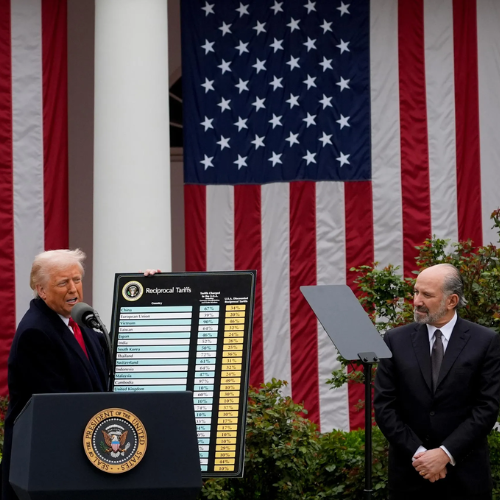On what was called “Liberation Day,” the United States shocked the world by announcing massive new tariffs on goods from many other countries. A tariff is like a tax placed on things that come into a country from elsewhere. The U.S. government said these new tariffs would help protect American jobs and factories.
This decision was not just about money or trade. It also sent a loud message: America is changing how it deals with the rest of the world. The president and his team explained that the country had been treated unfairly for too long. They believe that other nations were gaining too much from America’s open markets, while American workers and businesses were losing out.
What made this moment even more unusual was how it was presented. The event was made into a celebration. Speeches, banners, and strong language turned what was once seen as a policy decision into a national event. Calling it “Liberation Day” suggested that America was freeing itself from something bad. But for many people around the world, it felt more like a warning.
Over 50 Nations React to Aggressive Tariffs with Urgent Talks
The size of these tariffs was enormous. It was the biggest one-time tariff action in 70 years. Products from both friends and rivals of the U.S. were affected. The move made it clear: America is now ready to act alone, even if others don’t agree.
A World with Fewer Masks
For many years, countries explained their actions in ways that made them sound fair and reasonable. Even if a country was doing something tough—like putting sanctions on another country—it often said it was doing it to protect human rights or promote peace. Sanctions are like punishments. A country can stop another country from buying or selling things, traveling, or using banks.
But now, things are changing. With these new tariffs, America is showing a new style. It is no longer hiding behind friendly words. It is saying clearly: “We are doing this because it helps us.” This way of speaking and acting is more direct. It may seem harsh, but it is more open about the real reasons behind actions.
This “straightforward” approach doesn’t just affect trade. It also changes how sanctions are used. In the past, sanctions were seen as serious tools that should only be used with big international support, like from the United Nations. The idea was that countries should only punish others when everyone agrees it’s the right thing to do.
F-35 Fighter Jet Becomes $2 Trillion Disaster as Allies Abandon Costly Jet Amid Broken Promises
Over time, some powerful countries started using sanctions on their own. They said these actions were based on values—like stopping bad behavior or supporting democracy. Now, that explanation is less common. Today, some sanctions seem to be used simply because they support a country’s own goals, not because of shared rules.
America’s big tariff decision looks a lot like a new kind of sanction. It was a big action against many other countries, done for national reasons, without waiting for global agreement. This is a strong example of how the meaning and use of sanctions are changing.
A Shift in Global Rules
When the world was more connected through trade, countries had to follow certain shared rules. Organizations like the World Trade Organization (WTO) helped keep order. If a country did something unfair, others could file complaints and try to fix the problem. But with the U.S. now going in a different direction, these systems are under pressure.
China’s 54% Tariff & EU’s 20%: Trump’s Reciprocal Tariffs Hit Hard
The new tariffs seem to ignore the usual global process. They were decided quickly and announced without much warning. This breaks from the past, when changes like these were discussed and agreed on with others. Now, it seems that powerful countries feel they don’t need permission anymore.
This also affects other countries that may not be directly involved. In the past, if a country was neutral or stayed out of global issues, it didn’t have to worry about sanctions. But now, because of something called “secondary sanctions,” even these neutral countries can face pressure. If they do business with someone who is being punished, they might get punished too.
This creates a very different world. Countries now have to think twice before making deals or building partnerships. One big decision, like America’s tariffs, can change the rules for everyone. And with fewer shared systems and more one-sided actions, the world becomes less predictable.
The idea of fairness or shared values is no longer the main reason for global decisions. What matters most is interest—what helps a country right now. And with that, the way countries use tools like sanctions is being rewritten.


